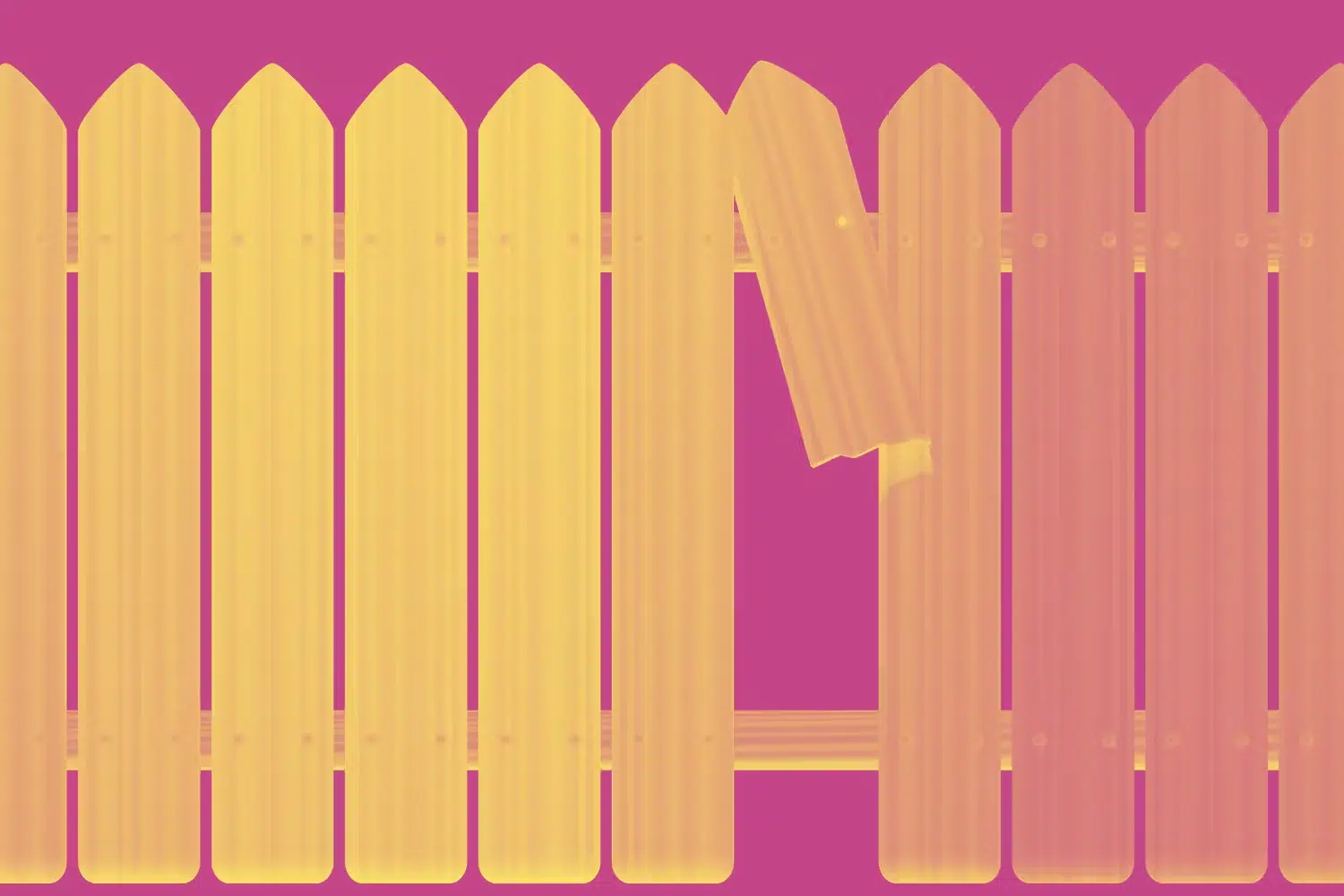
Need New Fencing? Here’s What It’ll Cost

Fences have always been multipurpose elements for a home: they can create privacy for your backyard, improve security elements, provide a safe place for pets or kids to enjoy the outdoors, and they might even improve the value of your home.
A lot of Americans are taking advantage of their backyards and creating fun spaces outside. While you’re considering your backyard glow-up, why not add that fence you’ve been eyeing? The typical cost for a new fence is between $1,788 to $6,961—but that’s a wide range! Let’s dig into the specifics of costing out a fence.
Factors in Calculating a New Fence Cost
A new fence cost goes way beyond simply paying for the fence materials. When you consider material costs and labor costs, the national average cost for a fence is about $4,375. Here are some considerations when planning and budgeting for a new fence.
Permits
Local building codes may require you to obtain a permit to build a fence, especially if you live in an urban area. These codes may also dictate restrictions, like the height of the fence or the fence material that you may use. On average, these permits cost between $20-$60.
Labor
You may be bold enough to DIY a fence building project, buy many people opt to hire laborers to do the job. Building a fence is very time-intensive, so labor typically takes up half the price. The labor rates will also vary based on the fence material. As a general rule of thumb, you can expect to pay between $30 to $80 per hour, and most professional installers can complete a fence of 150 to 200 linear feet within 20 to 35 hours.
Location
The location of your property can have an impact on your new fence costs. Fence installations in rural areas tend to cost more, since both laborers and materials have to travel farther to get there. The cost of materials also varies by region. If the area is hard to reach because of things like overgrown trees or narrow space to work in, there may be additional fees.
Landscaping
The terrain and makeup of the land can have a significant impact on your new fence cost. One major factor is whether or not your property has a slope. If the slope is minimal, you may want to have the ground graded evenly for a more level fence line.
Varied terrain can also require special measuring and building techniques to ensure the fence is aligned properly, which can increase labor costs. The costs are worth it if you want a longer-lasting product: a level fence is a sturdier fence, which will typically have more longevity.
The shape of the yard also matters. If a yard has some obstructions like trees or boulders, or even strange angles as it follows your property, more posts will need to be installed. The more posts you have, the more expensive the fence.
Types of Fences
There are a lot of fencing material options available, all with different pros and cons. Consider these three things when weighing your options: overall budget for the yard renovation, your desired style, and the level of maintenance you’re willing to put in.
Wooden Fences
Wood fences have a lower up-front cost, depending on the type of wood. They bring a warm and traditional look and feel to your property. You have the option to choose between more aesthetic styles, like the classic picket fence, and styles with more utility, like a wood privacy fence.
Wood fences do require more upkeep, but you can maintain your investment by treating the wood with a moisture sealant to prevent warping and rot. You can also add a stain to add to the longevity of your fence and give it a different look. The fence will need new stain every 2-3 years.
Vinyl Fencing
Vinyl fencing is popular because it is versatile and durable. Similar to wood, vinyl comes in a variety of styles and colors, and can even imitate the look of a wooden fence. Vinyl fencing is also maintenance-free—you’ll never need to paint or stain it like you would with a wood fence, which will save you a lot of time and money over the years.
Ornamental Aluminum and Steel Fencing
Ornamental aluminum and steel fencing is very durable and rust-resistant. These fences are more cost-effective than wrought iron, while still providing that elegant, classic look that is great for showcasing beautiful landscaping. This type of fencing also requires minimal maintenance, and you don’t have to worry about it rotting like wood or rusting like other materials.
Chain Link Fencing
While chain link fencing is not considered the most stylish or aesthetically pleasing choice, it still remains a popular option. Chain link is affordable, long-lasting, and can be used to create a safer backyard. In addition, chain link fences are evolving aesthetically, with the option to add color-coated finishes that blend in with the landscape or complement another existing fence material. You will want to add coating to the fence and occasionally clean it to prevent rusting, but overall chain link fencing requires minimal maintenance.
Options for Financing a New Fence
Your new fence doesn’t have to come out of pocket, especially if you’re combining it with other projects around the house or yard. Here are some basic financing options:
- A home improvement loan: This is a type of secured loan designed specifically for homeowners looking to complete more substantial projects around the house with a contractor.
- A home equity loan: A home equity loan is a type of loan in which the borrower uses the equity of his or her home as collateral. With a home equity loan, you borrow a specific amount, and then you make regular payments during a fixed repayment period, much like a mortgage.
- A home equity line of credit (HELOC): With a HELOC, your home is used as collateral, similar to a home equity loan. But a HELOC works more like a credit card: you have a certain amount of money available to borrow, but you only take it as you need it, paying interest only on what you’ve withdrawn.
- Financing options through retailers: The retailer that you purchase your fence materials from may have financing options that allow you to pay for the new fence costs in increments.
How to Save on Your Budget
There are a few ways you can make the most of your budget:
- Get multiple quotes. Do your due diligence when looking for fence contractors, to make sure that you’re getting a reasonable price and quality workmanship. Always ask if there’s a warranty.
- Consider sourcing your own materials. Laborers typically source materials as part of the project, but you may be able to find good deals on your preferred fence material by shopping independently. Be sure to ask your contractor if this is ok—some contractors won’t work with materials they haven’t selected.
- Be selective. You may be tempted to go for the cheapest material because you can save on your budget, or for the most expensive style, thinking that is the most high-quality option. Try instead to take your house, needs, and budget all into consideration, so you can balance cost with quality.
- Keep maintenance costs in mind. The cost of installing a new fence is not a one-time cost. Fences require maintenance, and some materials require more than others. For example, wood fences have a cheaper up-front cost but require more upkeep than most other fence types. Consider which is better for your budget—low up-front costs with ongoing maintenance, or higher up-front costs, with minimal additional maintenance costs.
- Collaborate with your neighbor. If your property shares a fence line with a neighbor, be sure to ask them before you put the fence in! Property lines should always be drawn out and agreed upon before any work is done. If you’re friendly with your neighbor, they might even split the cost of the fence with you!
Figuring Out Your New Fence Cost
There are a lot of factors that go into determining a new fence cost. Many of them depend on your needs and desires—what can you afford? What level of aesthetic value do you desire? How much upkeep are you willing to do? These questions will determine the total cost of installing and maintaining a new fence. Happy fence hunting!



